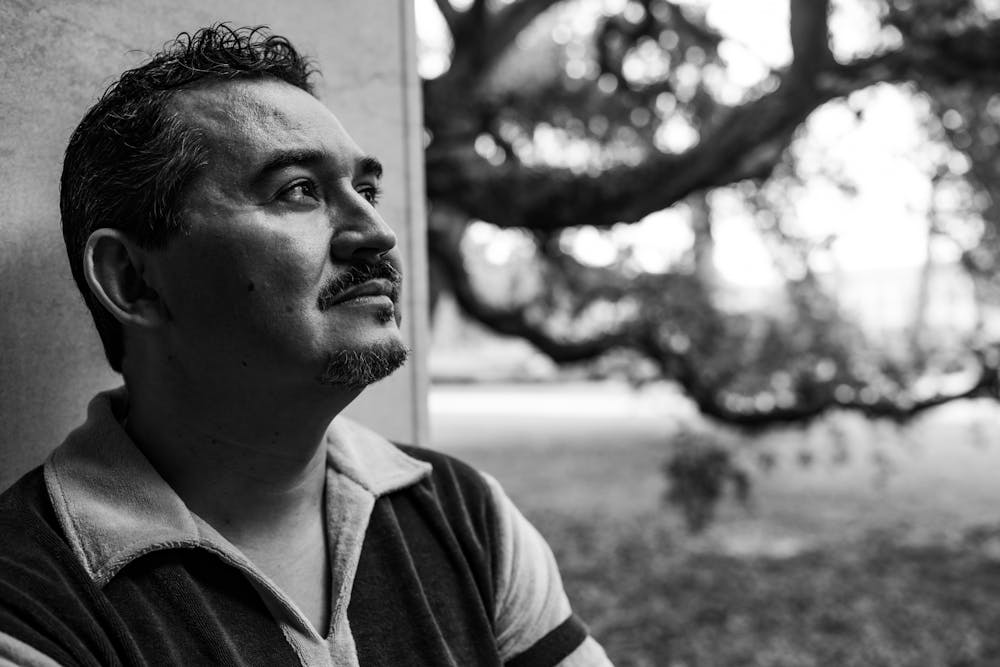Guggenheim Fellow Tomás Q. Morín on music, inspiration

Poet and assistant creative writing professor Tomás Q. Morín does not like musicals.
“I’ve never liked the movie ‘The Sound of Music.’ That was one of the first [musicals] that I really intensely disliked,” Morín said. “As an adult, when I discovered [jazz saxophonist John] Coltrane’s version of ‘My Favorite Things,’ it just completely blew my mind, and while it didn’t change my feelings about the movie, it definitely changed my feelings about the song.”
Morín has spent the past year writing, amongst other works, a short collection of poems in conversation with Coltrane’s album ‘My Favorite Things,’ after receiving the Guggenheim Fellowship in April 2022.
The fellowship, first awarded in 1925, describes itself as an award for individuals who demonstrate exceptional creativity, ability and promise in the arts.
“[The Guggenheim Foundation is] this group that has been around for so long, [it’s] so prestigious and has such a strong commitment to helping support the work of writers and other artists,” Morín said. “It’s like the ultimate pat on the back, not just for what you’ve done but for what they believe you can do.”
For Morín, the fellowship has allowed him to reevaluate his career goals for his writing, creating a space to focus on his art without external influence.
“It’s strange but also really wonderful to be creating art without having some external marker of validation at the finish line, like this project will only mean something or be a net positive if I actually get it published,” Morín said. “I think that’s how I’ve been coming at it before, and now it just feels more organic and wholesome.”
Rather than focusing on publishing, Morín said he has spent his year seeking joy.
“When we talk about a book coming into the world, a lot of times you are working for free,” Morín said. “Thinking of it in that way, it’s practical, but also it can be very self defeating. Instead, count those hours as hours of joy and play. Who wouldn’t count that as a win?”
Morín is the author of several poetry collections and a memoir entitled “Let Me Count the Ways.” His works explore difficult themes, including his obsessive-compulsive disorder and his father’s struggles with substance abuse.
“I’ve written a lot of difficult, sad poems over the course of my life,” Morín said. “I don’t want to just be the sad poet.”
Now, Morín is writing from brighter places — namely, Italy, where he spent a summer writing residency in a 16th-century castle in the Umbria region. Morín said that some of his poetry was inspired by his trip, but the majority of his work draws upon the banality of life.
“I feel like a lot of my inspiration for my work comes from very simple, mundane, day-to-day things,” Morín said. “Silly thoughts just go across the stage of your mind and most of us, we just chuckle at them and then just keep going and let the thought pass. But for me, those kinds of thoughts are the source of a lot of my poetry.”
Morín, who studied Spanish at Texas State University and Johns Hopkins University, has also worked as a translator. He developed the English libretto for the bilingual opera “Pancho Villa From a Safe Distance” and translated Pablo Neruda’s “The Heights of Macchu Picchu.”
“I felt like I was able to bring in my skills as a poet in a different way,” Morín said. “I usually have a very hard time catching and finding those opportunities, but if I just kind of sit back and do my work and put my work out into the world, eventually something fun and exciting will find me.”
For Morín, the Guggenheim Fellowship has allowed these exciting projects to find him while also providing the time and space to explore them.
“I’m just focusing on having fun and growing as an artist,” Morín said. “All of it just feels like such an opportunity to experiment.”
More from The Rice Thresher

Rice football players go Greek, join Omega Psi Phi fraternity
Rice has operated without fraternities or sororities since its founding. In their place, residential college systems have served as the core of student life. But this spring, three Rice students joined a fraternity for the first time in school history.

Core Teams talk raising kids at Rice
At most colleges, resident associates are students juggling their responsibilities alongside homework. At Rice, students aren’t the only ones who call the residential colleges home — RAs could be anything from a professor to a dean living down the hall along with their children.

Alumna Susannah Wright journeys from student to professor
When Susannah Wright graduated from Rice in 2018, the prospect of returning as faculty was nothing more than a pipe dream. Much like the tales she studies, Wright’s journey to professorship has taken her across the country and back again, landing her in a faculty role at Rice in fall 2024.

Please note All comments are eligible for publication by The Rice Thresher.